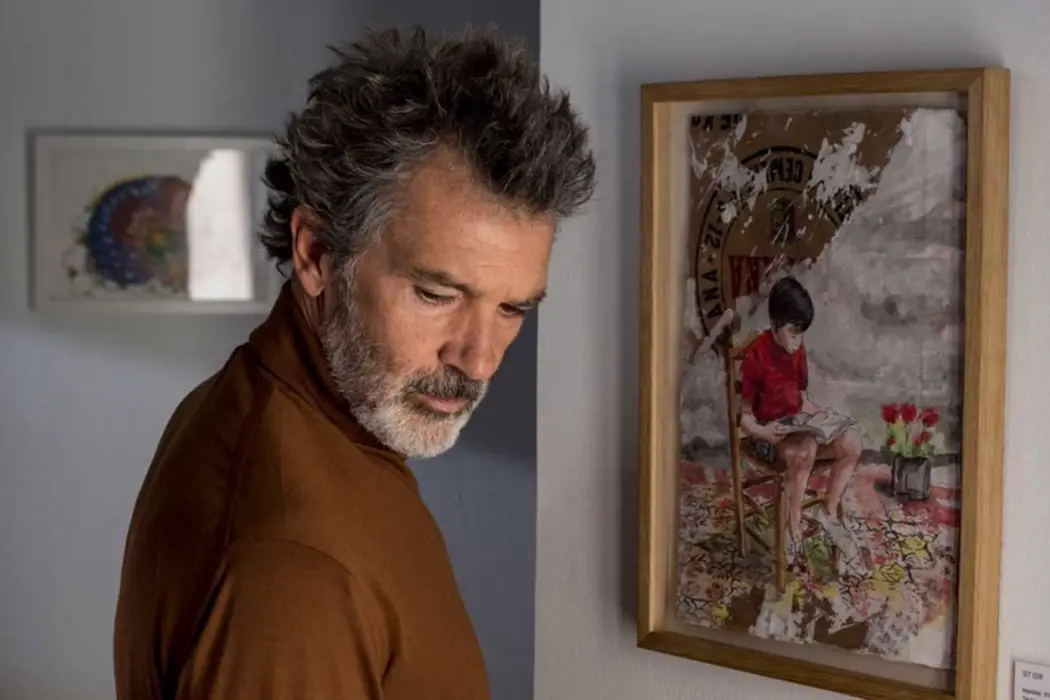TIFF 2019: All About Almódovar In PAIN AND GLORY

Monique Vigneault is a Mexican-Canadian film critic. She regularly covers…
The very fabric of Pedro Almódovar’s confessional melodrama, Pain and Glory, is one trenchant with a fog of regret — a reflection on the fleetingness of youth and the physical and emotional tears of age.
Lead by Antonio Banderas, the film follows Salvador Mallo, a retired Spanish director (whose gelled haircut and loud sartorial style uncannily resembles that of Almódovar‘s) suddenly paralyzed by grief, regret and rendered unable to create. Throughout the film Salvador stumbles around his Madrid apartment incongruously, suffering from choking fits, asthma and a myriad of other physical ailments while miserably plagued by his mother’s death. We later find out he’s also chasing memories of a transient relationship. Rather than turning towards film-making as a safe haven, Salvador begins dabbling in hard drugs to make the pain subside.
“You’re a dreamer,” Salvador’s mother, Jacinta (Penélope Cruz) sighs in a dreamy early memory, as the two make their beds in an empty train station – their indefinite home. Jacinta’s hair clings to her face and she carries a stony, overworked expression, carefully sewing her son’s tattered clothes.

This sequence appears early, setting the tone that this is a film benched on the past. For much of the first act, Salvador returns ceaselessly to memories of living in a cave in a rural Valencia village, constantly overcome with wonder in places where his mother isn’t.
In the haze of poverty and struggle, Salvador finds joy, beauty and a precocious taste for cinema, and it’s clear from his infancy that Salvador exhibits all the characteristics of a writer.
Death of the Artist
Almodovar’s underscoring and driving motivation — nostalgia — remains ever-present in his latest, soaked with his signature wistfulness and longing for the past. Albeit this particular, vastly personal exploration teeters onto the deeper, darker end of it — how grief and pain feel when art doesn’t exist within those margins.
While Almodóvar has always found the fine balance between the languorous sadness within melancholy and the hope that exists between it, Pain and Glory falters, revealing instead the washed-up, narcotic consequences when the artist simply can’t make art.
Make no mistake: Pain and Glory still looks and very much feels like an Almodóvar flick, with his signature crass Spanish wit and artful campy frames, but its conclusion feels far heavier than his past work. The entire narrative in Pain and Glory misses the mark where his other films don’t – Salvador’s fractured recollections of his youth contrasted by present turmoils remain discombobulated. In the end, audiences file out of the theatre feeling staggered and unable to catch a breath.

Chasing the Past
The idea of revisiting the past is one frequently present in his film canon, and Pain & Glory is no different. Unlike his previous critically hailed narratives, All About My Mother and Julieta, the focus isn’t on the female experience, instead, Pain & Glory reveals the human experience through Almodovar’s eyes. In Julieta, a deserted mother searches for her estranged daughter through letter-writing. In All About My Mother, a grieving mother seeks answers she couldn’t give her late son.
Almodovar‘s characters are constantly, irreparably confronted with loss, always looking back, turning around only to find they had forgotten themselves somewhere along the journey.
While his films are capable of great tragedy, they’re also paradisal tapestries of the innate beauty that blooms from within it, portraits of broken figures rising up from the rubble. But in Pain and Glory, the loss feels too grand, too all-encompassing that not even Mallo’s love for art can save it.
Eventually Salvador’s narcotic stopgap doesn’t last and both the physical and metaphysical turmoil boil towards the surface and Salvador loses all control, left only to confront the ghosts of his past. In the final moments is when we reach precisely the point of Pain and Glory: the moral that while art doesn’t always surface in tragedy, at least closure will.
Above all, the third installment of the Spanish director’s semi-autobiographical trilogy is a love letter to cinema.
What’s your favourite Almòdovar film? Let us know in the comments down below.
Watch Pain and Glory
Does content like this matter to you?
Become a Member and support film journalism. Unlock access to all of Film Inquiry`s great articles. Join a community of like-minded readers who are passionate about cinema - get access to our private members Network, give back to independent filmmakers, and more.
Monique Vigneault is a Mexican-Canadian film critic. She regularly covers world cinema on the festival circuit.













